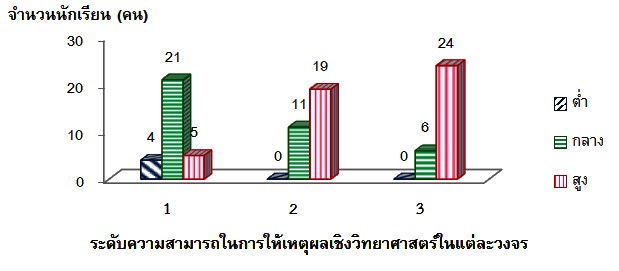การพัฒนาความสามารถในการให้เหตุผลเชิงวิทยาศาสตร์ เรื่อง ปริมาณสารสัมพันธ์ โดยการจัดการเรียนรู้ด้วยรูปแบบการสืบเสาะที่ขับเคลื่อนด้วยกลวิธีการโต้แย้ง
Main Article Content
Abstract
Pattharawan Chaimongkol, Skonchai Chanunan and Jintana Klamtet
รับบทความ: 28 กรกฎาคม 2559; ยอมรับตีพิมพ์: 12 ธันวาคม 2559
บทคัดย่อ
ความสามารถในการให้เหตุผลเชิงวิทยาศาสตร์มีส่วนสำคัญในการพัฒนาให้นักเรียนเป็นพลเมืองที่สามารถแสดงความคิดเห็น มีส่วนร่วม และตัดสินใจในประเด็นทางสังคมที่เกี่ยวเนื่องกับวิทยาศาสตร์ได้อย่างรอบรู้และมีเหตุผล และเป็นเป้าหมายที่สำคัญของโครงการหลักสูตรห้องเรียนพิเศษวิทยาศาสตร์ คณิตศาสตร์ และเทคโนโลยี โรงเรียนสตรีประจำจังหวัดแห่งหนึ่ง ในเขตภาคเหนือตอนล่าง การวิจัยครั้งนี้เป็นการวิจัยปฏิบัติการในชั้นเรียน มีวัตถุประสงค์เพื่อศึกษาผลของการพัฒนาความสามารถในการให้เหตุผลเชิงวิทยาศาสตร์ หลังการจัดการเรียนรู้ด้วยรูปแบบการสืบเสาะที่ขับเคลื่อนด้วยกลวิธีการโต้แย้ง เรื่องปริมาณสารสัมพันธ์ ของนักเรียนชั้นมัธยมศึกษาปีที่ 4 กลุ่มเป้าหมายคือนักเรียนชั้นมัธยมศึกษาปีที่ 4.3 จำนวน 30 คน ดำเนินการจัดการเรียนรู้ในภาคเรียนที่ 2 ปีการศึกษา 2558 เครื่องมือที่ใช้ในการเก็บรวบรวมข้อมูล ได้แก่ แบบทดสอบความสามารถในการให้เหตุผลเชิงวิทยาศาสตร์ และรายงานผลการสำรวจตรวจสอบของนักเรียน ผู้วิจัยได้วิเคราะห์ข้อมูลเชิงคุณภาพด้วยการวิเคราะห์เนื้อหาโดยการอ่านคำตอบของนักเรียนอย่างละเอียด และจำแนกกลุ่มคำตอบของนักเรียนโดยใช้เกณฑ์ของ Lawson (2009) ผลการวิจัยพบว่า การจัดการเรียนรู้ด้วยรูปแบบการสืบเสาะที่ขับเคลื่อนด้วยกลวิธีการโต้แย้งสามารถพัฒนาความสามารถในการให้เหตุผลเชิงวิทยาศาสตร์ เรื่อง ปริมาณสารสัมพันธ์ ของนักเรียนได้ โดยหลังการจัดการเรียนรู้นักเรียนมีความสามารถในการให้เหตุผลเชิงวิทยาศาสตร์ในระดับที่สูงขึ้น
คำสำคัญ: ความสามารถในการให้เหตุผลเชิงวิทยาศาสตร์ การจัดการเรียนรู้ด้วยรูปแบบการสืบเสาะที่ขับเคลื่อนด้วยกลวิธีการโต้แย้ง วิจัยปฏิบัติการ ปริมาณสารสัมพันธ์
Abstract
Scientific reasoning ability is the significant factor to develop students to be citizens who could express their opinion, participate and decision making on controversial socioscientific issues by using science knowledge and reason. Moreover, scientific reasoning ability is important goal of Science, Mathematics and Technology curriculum (SMAT) for students of one of girl school located at lower northern part of Thailand. In this study, a classroom action research was employed. The purposes of this study were to investigate the development of 10th grade students’ scientific reasoning ability after learning through argument-driven Inquiry learning model in the topic of stoichiometry. The participants were 10th grade students (room no.3) with 30 students from one of girl school located at lower northern part of Thailand in the second semester of 2015 academic year. The research tools included scientific reasoning ability test and students’ investigation report. The collected qualitative data were analysed by means of content analysis which carefully read students’ answer and classify answers by Lawson’s criteria (2009). The finding indicated that the students’ scientific reasoning ability after learning though Argument-driven inquiry activities was higher than that of the before one.
Keywords: Scientific reasoning ability, Argument driven inquiry Model, Action research, Stoichiometry
Downloads
Article Details

This work is licensed under a Creative Commons Attribution-NonCommercial 4.0 International License.
References
Acar, O., and Patton, B. R. (2012). Argumentation and formal reasoning skills in an argumentation based guided inquiry course. Procedia–Social and Behavioral Sciences 46: 4756–4760.
Berland, L. K., and Reiser, B. J. (2009). Making หense of argumentation and explanation. Science Education 93(1): 26–55.
Boonchom, S. (2001). Introduction of Research. 9th ed. Bangkok: Suwiriyasan. (in Thai)
Chulaluk, Y. (2013). Effect of Instructional Using Learning Stages of Basic Inferences on Scientific Reasoning Ability and Physics Learning Achieve ment of Upper Secondary School Students. Master of Education Thesis. Bangkok: Chulalongkorn Univesity. (in Thai)
Enderle, P., Grooms, J., and Sampson, V. (2012). Argument focused instruction and science proficiency in middle and high school classrooms. NARST Annual International Conference USA: Indiana University.
Hodson, D. (2008). Toward Scientific Literacy: A Teachers’ Guide to the History Philosophy and Sociology of Science. The Netherlands: Science Publishers.
Kemmis, S., and McTaggart, M., Eds. (1988). The Action Research Planner. Victoria, Australia: Deakin University.
Kolsto, S. D. (2001). Scientific literacy for citizenship: tools for dealing with the science. Science Education 85(3): 291–310.
Kuhn, L., and Reiser, B. (2004). Students Constructing and Defending Evidence-base Scientific Explanations. Annual Meeting of the National Association for Research in Science Teaching. Dallas: Texas.
Lawson, A. E. (2009). Basic inferences of scientific reasoning, argumentation, and discovery. Science Education. 94(2): 336–364.
Bao, L., Cai, T., Koenig, K., Fang, K., Han, J., Wang, J., Liu, Q., Ding. L., Cui, L., Luo, Y., Wang, Y., Li, L., and Wu, N. (2009). Learning and scientific reasoning. Science Magazine 323(5914): 586–587.
Nopporn, T. (2007). Efficiency of Innovation. Chiang Rai: Chiang Rai Rajabhat University. (in Thai).
Sampson, V., Grooms, J., and Walker, J. P. (2010). Argument–Driven Inquiry as a way to help student learn how to participate in scientific argumentation and craft Written Arguments: An Exploratory Study. Science Education 95(2): 217–257.
Santichai, A. 2010. Effect of Biology Instructional Using the Argument-Driven Inquiry Instructional Model on Ability in Scientific Explanation Making and Rationality of Upper Secondary School Students. Master of Education Thesis. Bangkok: Chulalongkorn University. (in Thai).
Sunee, K., Prechan, D., and Amplika, P. (2007). PISA 2006 Report. Bangkok. IPST. (in Thai).
Taweesak, N. (2005). Principle of Qualitative Research. NaKhon Ratchasima: Chokjalern Marketing. (in Thai)
The Institute for the Promotion of Teaching Science and Technology (IPST). (2012). Science Mathematics and Technology Class Curriculum for Senior High School 2012. Bangkok: Author. (in Thai).
